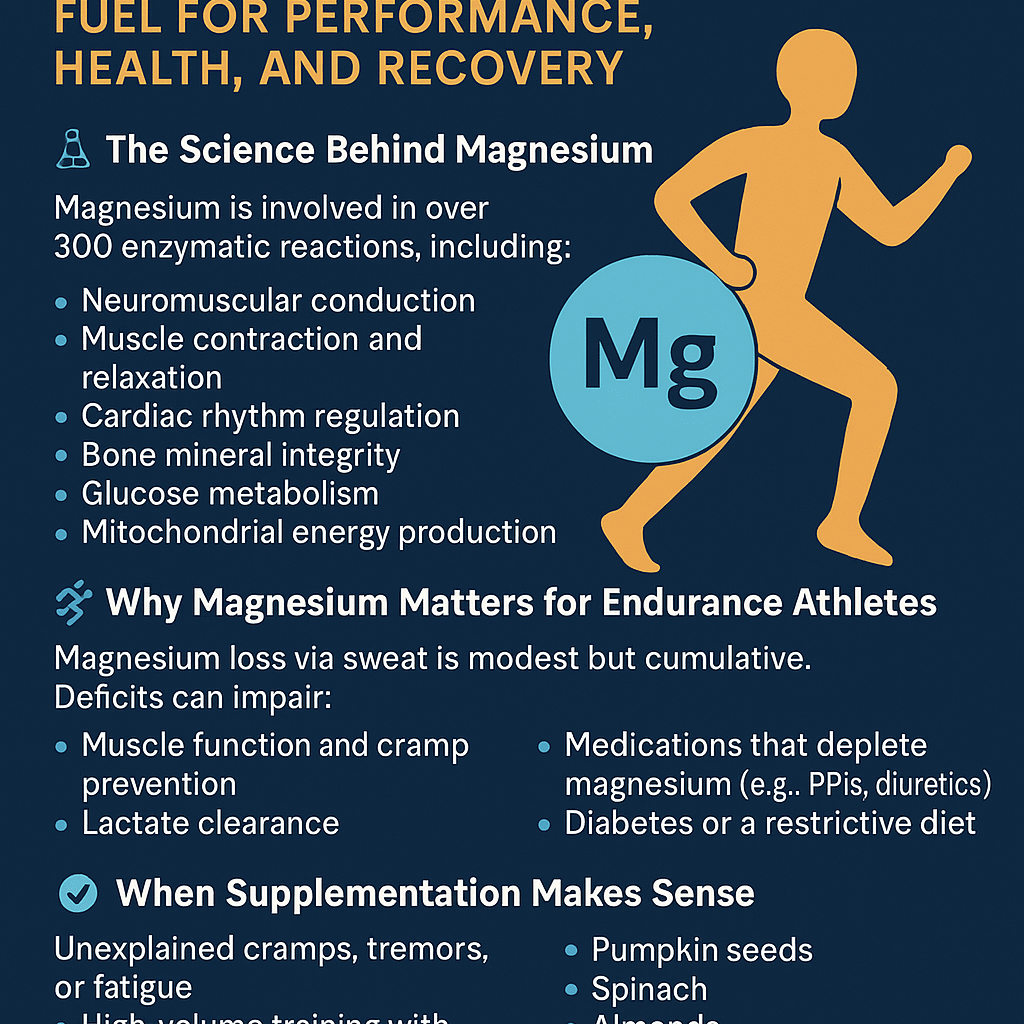Magnesium Supplementation: Fuel for Performance, Health, and Recovery
Whether you’re grinding through Ironman prep or managing daily stress while optimizing health, magnesium deserves priority in your nutrition strategy. This essential mineral, often underappreciated, plays a foundational role in physiological resilience—from muscle function to metabolic recovery.
But does everyone need a supplement? Not necessarily. Let’s break it down.
🧪 The Science Behind Magnesium
From a clinical and human physiology perspective, magnesium is essential—but supplementation is context-dependent.
It’s involved in over 300 enzymatic reactions, including:
- Neuromuscular conduction
- Muscle contraction and relaxation
- Cardiac rhythm regulation
- Bone mineral integrity
- Glucose metabolism
- Mitochondrial energy production
RDA (Recommended Dietary Allowance):
- Men: 400–420 mg/day
- Women: 310–320 mg/day
Note: These are minimums to prevent deficiency, not necessarily to optimize health or performance.
Common Risk Factors for Magnesium Deficiency
- High sweat loss (athletes, hot environments)
- GI conditions (e.g., Crohn’s, chronic diarrhea)
- Diuretic or PPI use
- Diabetes or insulin resistance
- Alcohol use
- Older age
🏃♂️ Why Magnesium Matters for Endurance Athletes
Magnesium loss via sweat is modest but cumulative. Over time, even small deficits can impair:
- Muscle function and cramp prevention
- Lactate clearance
- Recovery and adaptation
- Sleep quality and cardiac rhythm stability
Even if your lab results say magnesium is “normal,” serum levels only reflect about 1% of total body magnesium. Intracellular and ionized levels matter more—but are rarely measured.
✔️ When Supplementation Makes Sense
You might benefit from magnesium if you:
- Experience unexplained cramps, tremors, or fatigue
- Struggle with sleep or restless legs
- Train at high volume with heavy sweat losses
- Take medications that deplete magnesium (PPIs, diuretics)
- Have diabetes or a restrictive diet
Recommended Supplement Types:
- Magnesium glycinate or citrate (better absorption, fewer GI issues than oxide)
- Start with 200–400 mg of elemental magnesium per day
- Begin with a lower dose to check for side effects
- Take with food to reduce the potential for diarrhea
- Avoid magnesium oxide unless you also need help with constipation
🧭 Magnesium Supplementation: Decision Aid
Do you experience any of the following?
- Muscle cramps not explained by dehydration?
- Heavy legs or lingering fatigue despite recovery?
- Trouble sleeping or twitching/restless legs?
- PVCs (skipped heartbeats) or irregular heartbeats?
- GI issues, unintentional weight loss?
Note that any recurrent or severe symptom
should be evaluated by your physician.
Are you in a high-risk group?
- Endurance training >15 hours/week?
- Heavy sweat rate (visible salt crust on gear)?
- Use of PPIs, diuretics, or high alcohol intake?
- Vegan or restrictive diet?
- Diabetes, thyroid, or insulin issues?
🍽️ Are You Getting Enough From Food?
Track your diet for 3 days. You might be close to your needs if you eat:
- Pumpkin seeds (¼ cup): ~190 mg
- Spinach (½ cup cooked): ~75 mg
- Almonds (1 oz): ~80 mg
- Black beans (½ cup): ~60 mg
- Whole grain bread (2 slices): ~45 mg
- Dark chocolate (1 oz): ~65 mg
If you’re meeting 300–400 mg/day from food → You may not need a supplement.
If not → Increase dietary sources or discuss low-dose supplementation with your provider or nutritionist.
How to Supplement
- Magnesium glycinate or citrate: 200–400 mg/day
- Take with meals
- Monitor symptoms for 7–10 days
- Adjust dose or formulation as needed
🚫 When to Be Cautious
Too much magnesium can cause:
- Diarrhea, bloating, and nausea
- In rare cases (e.g., IV use or renal failure): bradycardia, hypotension, cardiac arrest
Stick to <350 mg/day from supplements unless guided by a medical provider.
🧘♀️ Final Thoughts
Magnesium is more than a recovery tool—it’s a performance enhancer, stress modulator, and metabolic workhorse. Whether your goals involve a podium finish or simply deeper sleep and better energy, optimizing magnesium is worth your attention.
Not sure if you’re getting enough?
Talk to a registered dietitian or your doctor. Functional health starts at the cellular level—and magnesium is one of the unsung heroes.
Where to get Magnesium supplements?
Magnesium is available in many places. After identifying your needs, find a reputable source. I prefer Metagenics products and have an online store. If you wish to discuss your magnesium needs, or other health matters, book a free consultation HERE.
References
Volpe SL. Magnesium and the athlete. Curr Sports Med Rep. 2015;14(4):279–283.
doi:10.1249/JSR.0000000000000172
U.S. Department of Agriculture. FoodData Central Database.
https://fdc.nal.usda.gov
Rosanoff A, Weaver CM, Volpe SL. Magnesium Deficiency. New England Journal of Medicine. 2024;390(6):547–559.
doi:10.1056/NEJMra2301612

Join Our Mailing List